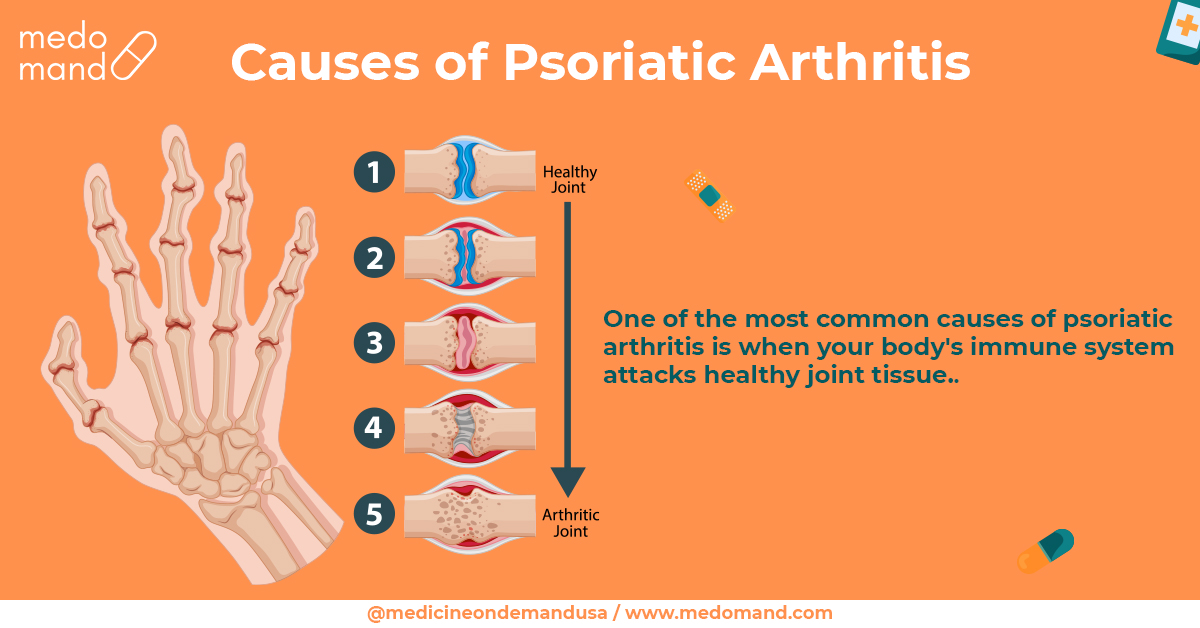A chronic inflammatory disease, psoriatic arthritis is characterized by swelling, stiffness, and joint pain. Psoriasis affects more than one-third of people in the USA population. It can start at any age but most commonly appears between the age of thirty and fifty. Diagnosing psoriatic arthritis can be difficult as the symptoms are similar to other inflammatory arthritis forms, such as rheumatoid arthritis.
Causes of Psoriatic Arthritis
One of the most common causes of psoriatic arthritis is when your body’s immune system attacks healthy joint tissue. This causes pain, stiffness, swelling, and inflammation. But, it is not clear why it happens. Many professionals believe that both environmental and genetic factors play a role.
Researchers have uncovered genetic signals that may leave individuals predisposed to the condition. Besides, certain medications, injury to the skin, and illness are the common triggers.
Yet, the extent and role each plays are still mainly unknown.
Symptoms of Psoriatic Arthritis
The symptoms of psoriatic arthritis are pretty diverse and can affect nails, skin, ligaments and joints. Here are some of the most common symptoms are:
- Lack of energy or fatigue
- Redness, blurry vision, pain, eye inflammation
- Separation from the crumbling of the nails, tiny dents, or nail bed
- Inflammation or sensitivity where ligaments or tendons attach
- Pitting edema of the extremities
- Inflammation of the toes or fingers
- Joint stiffness, swelling, or pain of one or more joints
Detection of psoriatic arthritis in the early stages can help you prevent permanent joint damage. But, some of these signs may be even unnoticeable or mild. It is essential to be aware of the warning symptoms before the flare-up happens or gets worse.
Psoriatic Arthritis Nails
It affects up to 80% of patients with psoriatic arthritis. Usually, they are indicated by thickening, ridging, crumbling, pitting, or color changes. In the case of onycholysis, the nail separates from the underlying nail bed. The detachment is painless. It can be an issue because it creates bacteria and fungi pockets to develop.
So, it is imperative to keep your nails short to minimize the damage from psoriatic arthritis nails.
Psoriatic Arthritis Hands and Feet
Psoriatic arthritis hands and feet are another recognizable sign given there is a considerable amount of swelling. Such swelling can cause stiffness, tenderness, and pain in the affected limb. It can give an almost sausage in extreme cases like look to your toes and fingers. It is very significant to recognize and consider treatment options as the joint damage can lead to various types of deformities in your feet and hands if left untreated for long.
Rash
A rash caused by psoriatic arthritis is one of the most distinct or recognized symptoms of psoriatic arthritis. Frequently, it will appear on the lower back, knees, elbows, scalp, face, and hands. But, it can appear anywhere.
Generally, the psoriatic arthritis rash has silvery or white scales and thick red patches on the skin. Still, it may present for different persons in presentation and silvery. Light therapy and topical medications are common choices to relieve the symptoms.
Treatment for Psoriatic Arthritis
It varies from individual to individual depending on their family history and the severity of the case. Your health care provider will be able to recommend the treatment option that fits best for your circumstances, but here are some common treatments include:
- Biologics
- Corticosteroids
- Immuno-suppressants
- Disease-Modifying Antirheumatic Drugs or DMARDS
- Non-Steroidal Anti-Inflammatory Drugs or NSAIDs
It would help if you talked to your doctor about various treatment options that work best for your condition.
Everyday Habits that Can Worsen Psoriatic Arthritis
There are some habits that worsen the inflammation in the body and worsen the effects of psoriatic arthritis. The habits that increase inflammation include having a high-fat diet and getting enough sleep. Smoking increases the severity and risk of psoriatic arthritis. Obesity can also make the psoriatic arthritis effects worse, as the extra pounds increase stress on joints that are already inflamed and lower your response to biological meds.
Better Habits for Psoriatic Arthritis
It would help if you had a healthy diet rich in vegetables and fruits. Some foods can help fight against inflammation by switching fiber immune cells from pro-inflammatory to anti-inflammatory. For instance, fish oil helps to improve the immune system. Thus eating fish at least twice or thrice a week can be constructive. Besides, consumption of alcohol should be done in moderation as it mixes very poorly with medicines.
Maintain a healthy weight– You should maintain a healthy weight for lining a healthy life as such and your well-being. Besides, weight reduction by following a diet with a hypocaloric diet is suggested for patients who are overweight as losing weight improves the psoriatic arthritis severity and the response of obese patients to the biological drugs treatment.
Avoid infection- Keep extra care of your hygiene. Ensure to regularly wash your hands to avoid getting infected with harmful germs from your surroundings. Any kind of infection in your body can weaken the immune system, making it at risk of getting psoriatic arthritis.
Try to reduce stress– Any kind of stress can activate inflammation in your body. Therefore, you should perform activities that can help you reduce stress, such as exercise and meditation and other fun activities.
Try to get enough sleep– It is imperative to have a sound sleep for at least six hours a day. Too little sleep can cause inflammation, whereas adequate sleep help strengthens the memory of the immune system.
Quit smoking- Smoking or consumption of tobacco in any form can interfere with the treatment for psoriatic arthritis, making it less or ineffective.
Exercise regularly– Twenty minutes of moderate exercise a day can stimulate the immune system. Besides, it also helps to cause an anti-inflammation response in your body.
Here are some great ways to lessen the psoriatic arthritis effect:
- Stop smoking
- Acupuncture
- Massage
- Weight loss
- Occupational therapy
- Physical therapy
- Low-impact exercise like swimming, yoga, tai-chi
If you need any kind of medication or advice on how to take the medication for psoriatic arthritis from your pharmacists, call Medomand support which is there to help you 24/7.
Disclaimer: The information contained in this article is for educational and informational purposes only and should not be relied upon for any diagnostic or medical purpose or the treatment of any symptom or condition.

